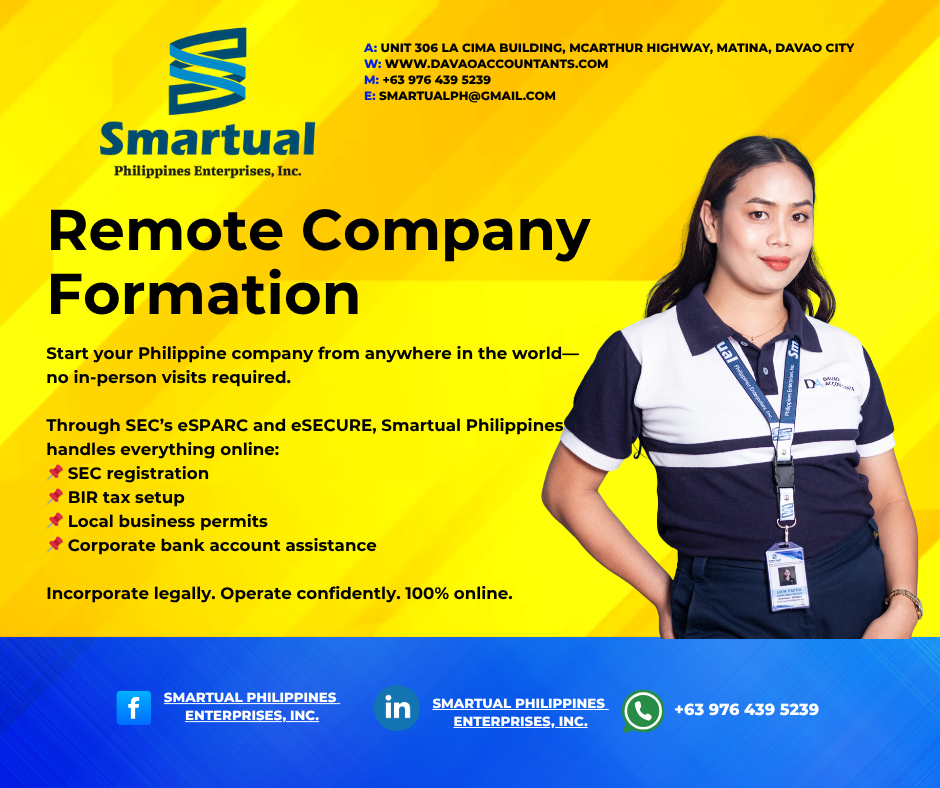Summary:
- SEC registration can be completed in as little as 10–15 working days if you prepare the right documents and use online portals.
- The minimum capital requirement is usually ₱5,000 unless your industry is regulated or you plan to hire foreigners.
- After SEC approval, you still need BIR, LGU, PhilHealth, SSS, and Pag‑IBIG registrations to be fully compliant.
- Smartual Philippines offers end‑to‑end company formation packages starting at ₱55,000, inclusive of government fees.
Introduction
If you are planning to register a corporation in the Philippines, 2025 is the best time to do it. The SEC has fully digitised its Company Registration System (CRS) via SEC eSPARC, allowing most applicants to complete the entire process online. Whether you are a local entrepreneur or a foreign investor looking for company formation in the Philippines, this guide will walk you through everything you need to know—from choosing a corporate structure to getting your Certificate of Incorporation and beyond.
Filipino SMEs continue to be the backbone of the economy, and recent tax reforms such as CREATE have lowered corporate income tax from 30 % to 25 % (or even 20 % for small firms), making incorporation more attractive than ever. However, missing a single documentary requirement can push your timetable back by weeks. That is why we created this definitive 1,500‑word playbook: so you can avoid costly delays and focus on growing your business.
1. Why Incorporate in the Philippines?
a. Limited liability protection
A properly registered corporation separates your personal assets from business liabilities, shielding owners and directors from most debts and lawsuits.
b. Access to capital
Corporations can issue shares, attract foreign equity, and tap bank loans or venture capital more easily than sole proprietorships.
c. Talent acquisition
Top employees—especially tech and finance professionals—prefer corporations because of better benefits, stock options, and employer branding.
d. Credibility with customers and suppliers
An “Inc.” or “Corporation” suffix signals stability and compliance, critical for winning large contracts or government tenders.
e. Tax optimisation
With corporate income tax down to 25 % (20 % for SMEs), plus deductible expenses and VAT zero rating for export‑oriented firms, incorporating can significantly reduce your effective tax rate versus operating as an individual.
Bottom line: Incorporation is no longer a luxury—it is a competitive necessity for scaling in the Philippines or for using the country as a hub for regional expansion.
2. Pre‑Registration Checklist (Pro Tip: Finish This Before Opening the SEC Portal)
| Item | Details | Responsible |
| Reserve a corporate name | Search on the SEC eSPARC for identical or confusingly similar names. | Incorporators |
| Draft Articles of Incorporation (AoI) & By‑laws | Use the One‑Person Corporation or Ordinary Stock templates if applicable. | Corporate Secretary / Lawyer |
| Identify incorporators & directors | At least two incorporators (who may be Filipino or foreign), each holding at least one share. The majority of directors must reside in the Philippines. | At least 2 incorporators (may be Filipino or foreign), each holding at least 1 share. The majority of directors must reside in the Philippines. |
| Prepare Treasurer‑in‑Trust (TIT) appointment | Needed for bank deposit of paid‑in capital. | Incorporators |
| Minimum capital | Generally ₱5,000; higher for foreign‑owned or regulated sectors (e.g., ₱10 million for finance leasing). | CFO |
| Registered office address | Lease contract or title + barangay clearance. Virtual offices allowed in some LGUs. | Admin |
| Digital signatures | eSECURE allows for digital validation and authentication of documents. | All signatories |
Smartual Tip: We maintain ready‑made AoI templates adapted for BPOs, e‑commerce, fintech, and manufacturing to cut drafting time by 80 %.

3. Step‑by‑Step SEC Registration Process (2025 Update)
- Create an account on the SEC eSPARC
Upload valid IDs and pay ₱50 verification fee. - Name Reservation
Input your proposed corporate name. Approval is usually within 24 hours. - Fill out the Application Form
Enter corporate details, incorporators, share structure, purpose clauses, and upload AoI, By‑laws, TIT, and ID scans. - Pay Filing Fees
Typical SEC fees: ₱2,000 filing + 1/5 of 1 % of authorised capital stock + legal research fee. Pay via GCash, PayMaya, or bank. - Online Review by the SEC Company Registration and Monitoring Department (CRMD)
Average review time: 3–5 working days. They may email clarification requests; respond within 48 hours to avoid rejection. - Issuance of Payment Assessment Form (PAF)
Settle any balance, then download your Certificate of Incorporation (CI) and stamped AoI/By‑laws. - Buy Stock & Transfer Book
Physical books are still required. Have them stamped at the SEC front line or the courier site.
Congratulations! You are now a legal entity. From here, you have 30 days to complete tax and local registrations.
4. Post‑Incorporation Compliance Obligations
| Agency | Timeline | Key Documents |
| On or before the start of operations | Within 30 days of CI | BIR Forms 1903, 0605, DTI‑POS certification for e‑invoicing, if applicable |
| City/Municipality (Business Permit) | On or before start of operations | Lease contract, SEC docs, ≤ ₱2,000 mayor’s fee |
| SSS, PhilHealth, Pag‑IBIG | On or before the start of operations | Employer registration forms, board resolution |
| Books of Accounts | Register loose‑leaf or computerized records | BIR permit |
| Annual compliance (SSS, BIR, and LGU) | GIS, AFS, BIR ITR, Mayor’s permit renewal | Various |
Missing any of the above can trigger penalties of ₱1,000–₱10,000 per lapse, plus possible closure orders from LGUs.
5. Timelines, Costs & Common Bottlenecks
| Activity | Average Time (DIY) | Time with Smartual | Key Pain Point |
| Name reservation | 1 day | 4 hours | Duplicate names |
| SEC review | 7-10 days | 3-5 days | SEC review |
| BIR registration | 5 days | 2 days | Queuing, incorrect OCN |
| LGU Permit | 2 months (Davao City) | 1 month | Zoning clearance |
Cost Snapshot (₱): SEC fees ~₱8,000; Notary & books ₱4,000; BIR stamps ₱1,200; LGU fees vary ₱8,000–₱25,000.
6. How Smartual Philippines Accelerates Your Company Formation
- Single‑window service: We liaise with the SEC, BIR, and LGUs on your behalf.
- Legal drafting included: Our in‑house lawyers craft customised AoI clauses that anticipate PEZA, BOI, or fintech regulations.
- Digital board meetings: Skip physical signings—use our Docusign‑enabled workflow.
- Transparent pricing: Fixed professional fee + official receipts of all government charges.
Clients report up to 30 % savings in opportunity cost versus managing incorporation internally.
Frequently Asked Questions
Q1: Can 100 % foreign ownership register a corporation in the Philippines?
A: Yes, subject to the Foreign Investments Negative List (FINL). BPO, export manufacturing, and e‑commerce are usually allowed.
Q2: How much paid‑in capital is required?
A: For domestic corporations serving the local market, the minimum is typically ₱5,000. If >40 % foreign equity and catering to the domestic market, you need US$200,000 (~₱11 million) unless qualifying for exemptions such as high‑tech or employing 50 people.
Q3: Can I register remotely?
A: Absolutely. All incorporators can be abroad; notarization and apostille of IDs are accepted. Smartual handles courier logistics. In 2025, the SEC’s eSECURE platform made it possible to form corporations 100% remotely.
Conclusion & Call to Action
Incorporating in the Philippines in 2025 is faster than ever, thanks to the SEC’s digital tools, but success still hinges on complying with a web of national and local regulations. By following this guide, you can register a corporation in the Philippines within a month—but with Smartual Philippines as your partner, you could be fully operational in as little as 10 working days.
Ready to make your Philippine market entry a reality? Book a free 30‑minute consultation with our company formation specialists today and receive a tailored quotation within 24 hours.




